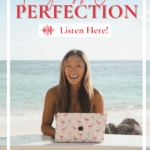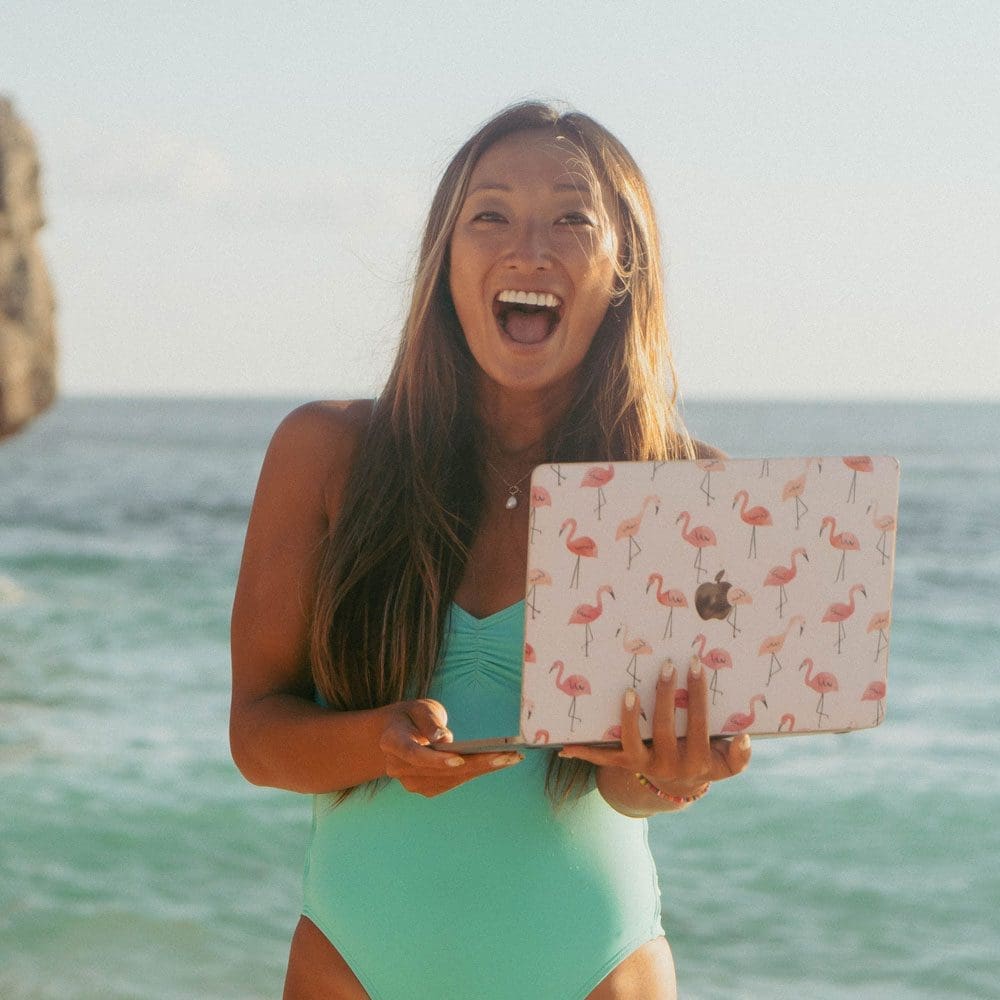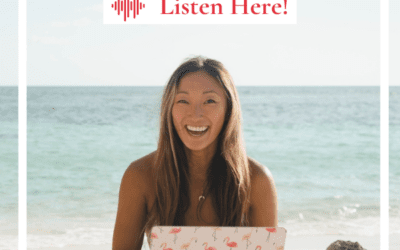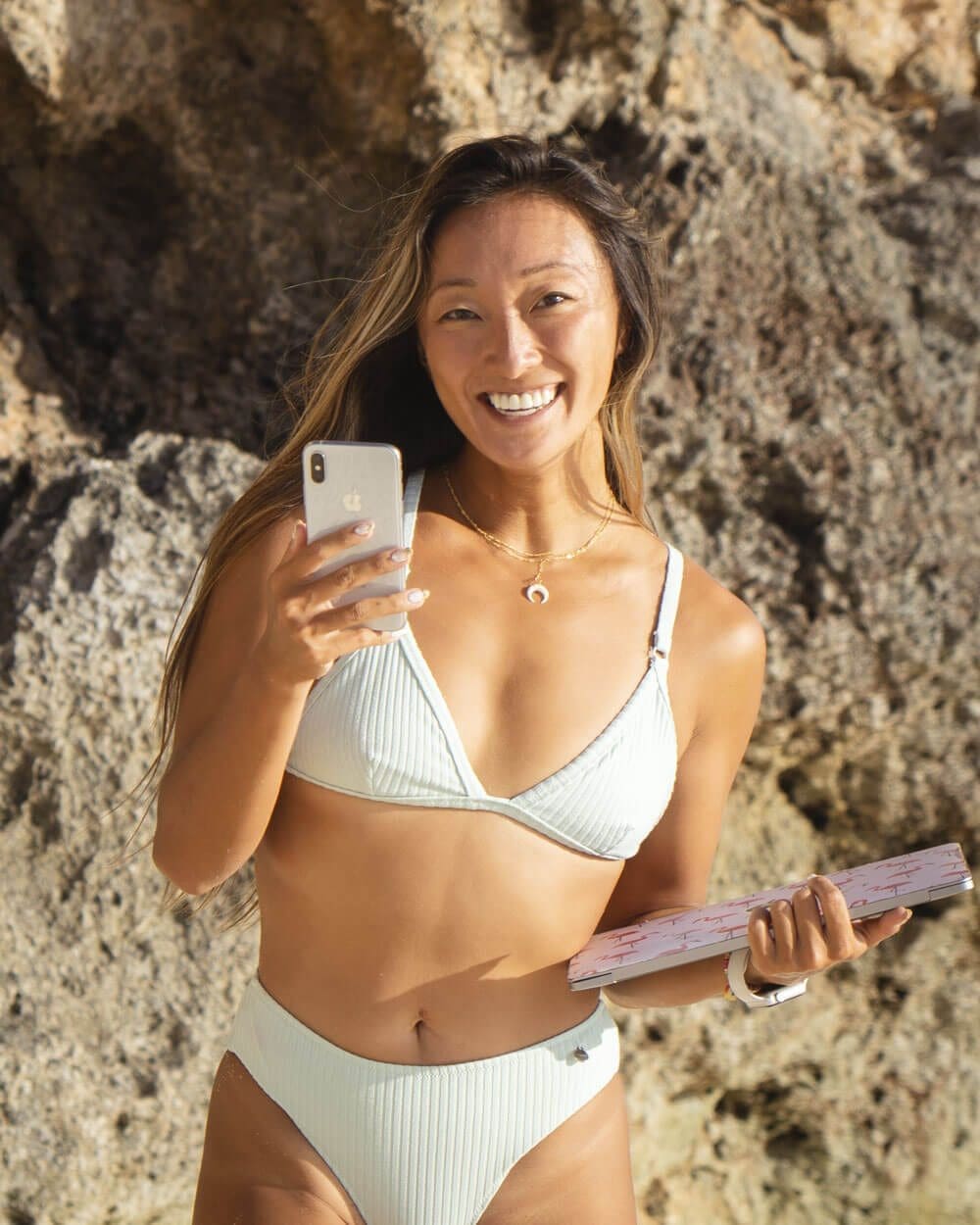This week we talk to member of the Wanderlover Business Academy and psychotherapist, Anabel Khoo. As the founder of KAI YIN Spells and Skills who took her business online during the pandemic (02:12), we talk about how to embrace the uncomfortable (09:27) and the importance of taking a self compassionate approach to healing (22:52).
✧ Follow Anabel on Instagram: https://www.instagram.com/kaiyinspellsandskills/
Quick Links
✧ Join the Digital Nomad Society for Just $7/Month
✧ Follow The Wanderlover Podcast on Instagram
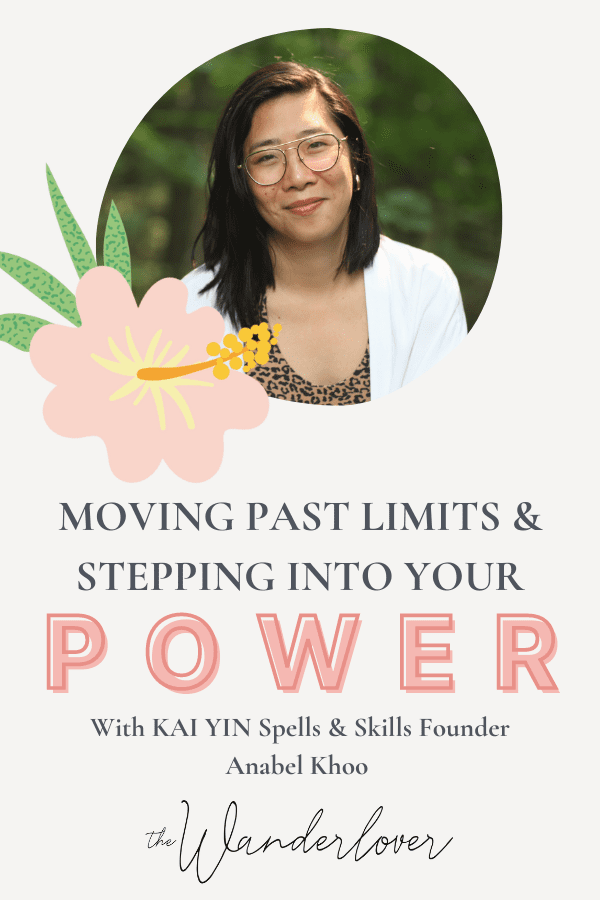
Audio Transcript
Intro (5s):
The Wanderlover podcast was created with a mission to enable travel and freedom through entrepreneurship. I’m your host, Danielle Hu business mentor, content creator, and founder of The Wanderlover tune in every week for episodes about travel online business, social media, and mindset that will inspire you to take massive action towards living the life of your dreams. If you’ve been enjoying the Wanderlover podcast, if you’ve been tuning in and finding inspiration and taking away value, it would mean so much to me. If you could take a second to leave us a review on apple podcasts, I continue to record these episodes for you every single week and take all of your comments and feedback to heart.
Danielle (52s):
Thank you guys so, so much. Hi guys. Welcome back to The Wanderlover Podcast This week on the show we’re bringing on special guest Anabel Khoo founder of Kai Yin Spells and Skills, and also a member of the Wanderlover Business Academy. She is a psychotherapist facilitator and interdisciplinary artist dedicated to cultivating holistic collective healing and social justice. Excited to be sharing her story expertise and online business journey today. Welcome to the show Anabel!
Anabel (1m 25s):
Thanks, Danielle. It’s so nice to be here.
Danielle (1m 28s):
We’re so happy to have you, so where are you in the world right now? Where are you based?
Anabel (1m 34s):
I am currently in Toronto, Canada.
Danielle (1m 37s):
Amazing. What is your background? Let’s take it a step back. Where do you come from and what is your business?
Anabel (1m 43s):
Sure. Yeah, well, I actually, I was born in Penang, Malaysia as a kid. My family immigrated to Montreal when I was about three. So I grew up in Canada and I moved to Toronto in 2020. So almost 10 years ago. Yeah. By myself. Yeah. I worked in community video actually for a number of years. And so I moved here for a community video job.
Danielle (2m 9s):
And when did you start KAI YIN Spells and Skills.
Anabel (2m 13s):
So I started KAI YIN Spells and Skills really recently. I think I officially announced it and put it together last year. And it’s sort of been, yeah, a really interesting journey, you know, during the pandemic, it’s been a bit tough to feel like you have a solid base to make plans on, but it also gave me a lot of perspective. I think a big part of why it actually happens last year instead of like 10 years from now … is that yeah, like, a lot of things were put into perspective. Like when things are really hard, I kind of spurred me to really want to dedicate like, you know, like if things are going to be this hard and if we don’t have a lot of time left with these other know, like time is really precious.
Anabel (3m 0s):
I think that was something I learned that really, you know, a number of things happened that I, I basically had, you know, a bit of an epiphany and I wanted to just, yeah, I really do the things I really love doing.
Danielle (3m 14s):
I did do that. So when did your journey with psychotherapy start?
Anabel (3m 18s):
Yeah, so that was about six years ago now. So I graduated in 2020 for my program. And I think at that point I had done some types of embodied practices, like dance, especially I guess, like some yoga, but really I was combining those new experiences at the time, like actually engaging with my body, with the things that I had just been studying. So I did a masters in communication and culture. And at the time, six years ago, I was studying two-spirit queer and trans people of color artists and performers as activism as a way of creating social movements, a way of healing.
Anabel (4m 9s):
And so that theory was really exciting and amazing. And at the same time, yeah, it was writing a lot. I was like thinking a lot and I really felt the urge to combine that with actually like embodying those skills and reaching folks, having worked, doing workshops. So yeah, you know, that combination of, you know, wanting to, I guess, contribute to this collective healing, plus a lot of the personal transformations that I was experiencing through dance. I did a dance intensive program through Ilana diversity dance company.
Anabel (4m 49s):
They’re an amazing dance company in Toronto, kind of breaking down a lot of barriers. And there’s amazing in so many ways. I can’t even describe it, but people look them up and they’re awesome. And they changed my life. And yeah, I just wanted to combine those, those two things.
Danielle (5m 12s):
It sounds like you found your passions that you went to school, you got the certifications and the decrees, and it took the pandemic to really combine those passions with entrepreneurship. And you did mention, like you had an epiphany, did that really just come to you one day? You’re like, this is what I need to do. How did you end up fully trusting yourself to go forward with entrepreneurship?
Anabel (5m 36s):
Yeah, I think it was, you know, I’m sure under the surface, it was sort of bubbling for a while. Like, you know, I was in therapy school. I knew I wanted to have a private practice that really focused on marginalized folks. And I think really it was actually through just sort of have like hitting a wall. Like I wasn’t, it’s not like it was a beautiful, like happy if Tiffany, like I like, yeah, like I wasn’t relaxed. Like I like hit a wall. I was really burned out. I felt like I was just like trying so hard to be someone I wasn’t like, I dunno, just like try to meet all these different standards in my head of like, who I thought I had to be.
Anabel (6m 19s):
And I was like hiding parts of myself. Like I like, you know, not telling anyone that I was like, yeah, like things I was passionate about, like spirituality and magic and doing things in this really intentional way. Like I was like, yeah, I just hit a wall. I couldn’t do it anymore. And obviously like stress added to it. So I kind of had a melt down and then, you know, I’m sure many of us had meltdowns during the pandemic, you know, like it’s like, we tried our best, but really like the conditions were just not very relaxing. But in that process, I just sort of realized like, it’s sort of like, yeah, like that rebirth when you’re like, wow, if I could do it over again, like I had a second chance or like I only have like 10 days left to live.
Anabel (7m 9s):
Like what would I do? And so I think that was kind of the epiphany of like, I just got so tired of hiding who I was and yeah, I think I was getting one of my, I had one of my friends, Sarah in who lives in New York. Who’s an amazing artist named cyan rose. And she designed the logo for my practice. And I think it just started, like, I think I just wanted to name it something like Annabella who therapy, like something just pretty descriptive, but kind of basic. But then I was brainstorming just on my own and you know, just like for fun, I kind of threw in the name, KAI YIN because that’s actually my Chinese name and it’s an, I don’t, I hadn’t ever, I don’t share that much with people like up until, I guess now I do, like I just threw it in and then yeah, it was like through that process, like when you were talking about like names and logos, she actually pointed it out like, oh, that actually has a really cool ring to it.
Anabel (8m 16s):
And it’s like really interesting. And so just having someone else sort of reflect that back to me was really helpful. And yeah. Then it kind of all came together. I think I just really needed that, like support and validations.
Danielle (8m 32s):
Yeah. And how does it feel now? So trusting yourself and letting it kind of bubble over into a point where it’s now your reality and you no longer have to hide. How was that transition and what are you feeling right now?
Anabel (8m 46s):
Yeah, I mean, it’s been really like a bit of a rollercoaster. Like it’s sort of that process. Like I think you talk about it a lot of like, you know, you’re when you step into what you actually want to do, then there’s like all these internal mindset, things like these old wounds of like, but I can’t, or like, I don’t, I don’t, I’ve never had this experience before. Like, and so our bodies and like our nervous systems are like, emotions are just like, it’s like, there’s a puzzle. And it’s like, you feel like you want it, but you don’t know, You can put it together and
Danielle (9m 26s):
You’re yin defence mode.
Anabel (9m 28s):
Exactly. Yeah. So, you know, I’m like, I’m noticing a lot of like doubt and fear, but I think I’m also trying to remember, like, I like sometimes I just try to name things. I know I used to be scared of like things. I was so afraid to do things. I really like didn’t think I could do that. I did. And that’s kind of helpful to be like, no, you, you have been here before in a way, like it’s just unfamiliar. So like the whole time you’re doing this transition, like it’s okay to just accept that it’s going to be really uncomfortable. Like I just literally say that to myself out loud, like in the morning when I’m breaking out, I’m like, it’s just gonna be really uncomfortable today.
Danielle (10m 15s):
At least you’re honest with yourself. Right. And you’re calling it for what it is.
Anabel (10m 17s):
Yeah. Yeah. It’s normal. Like it’s just going to be really uncomfortable and then you’re going to do it. And then like, then you’ll, you’ll realize that like you can, you can do it. And, but yeah, like it’s normal for it to feel really scary.
Danielle (10m 35s):
Yeah. And what’s cool is like you recognizing that you’ve been able to do difficult things in the past and you’ve overcome a lot of things that you once thought was impossible. So now in every present moment, what you think is impossible you’ll know in a few months, time in a year or two, and you’re going to look back and be like, that was nothing similar to all of the past experiences you’ve gone through as well.
Anabel (11m 1s):
Yeah. Like I think there’s ways, I guess yeah. That you change, but you can’t really, you don’t really notice them like sort of like with, I don’t know, like anything growing, like a plant, like, you know, if you just like, look at it every single day, it doesn’t really seem like it’s doing much, but then if you, you know, when they do those, like time-lapse things where there’s like a camera and it’s like 500 days of this plant. And then it’s like, whoa, it’s like doing all these things and it’s just so subtle. Like you don’t really pick up on it.
Danielle (11m 32s):
Yeah. And I think by you doing all of these difficult things and recognizing them in yourself, this is how you’re able to further and better support your clients. Right. Because you’re coming from a firsthand experience. Like, I know this is uncomfortable. I know this is supposed to be uncomfortable for you too, but I’ve gotten through it using these tactics. And now you’re able to then share that with some, from experience with the people you work with.
Anabel (11m 60s):
Yeah. Yeah. That’s true. Like a lot of the things I teach people or help facilitate is like some kind of transformation or another and yeah. Like transformations are really uncomfortable. Like it’s unknown. Like I think a lot of, I think a lot about, you know, when like a butterfly, like basically a caterpillar is like, suddenly there’s just like this weird feeling we get like we as us as caterpillars. And then we just like, suddenly are building this picture. You’re like, we don’t even know why it’s like, it’s really just really primal. And it’s almost like you’re, you’re isolating yourself.
Anabel (12m 40s):
Like, and I’m, I’m sure that doesn’t feel great necessarily. Like, I don’t know if that, to me, that’s like the experience of like all the fears and the doubts and like just being really like stuck. That’s all, you know? And then just over time, like you just start to outgrow that. Like I think I’m, I think I’m hopefully getting to that phase where like, I’m starting to get annoyed with being like so scared all the time. Like I just have that impulse to like, maybe cause it’s spring, but I’m just like, I just want to like burst out. Yeah. Like I just, I don’t want to like hide anymore. I just like, I’m tired of being scared. I don’t really, I don’t care. I don’t know what will happen, but it feels like, you know, slowly you gain that strength and then one day you kind of just like burst out and then you’re like, I’m completely different now.
Danielle (13m 32s):
Yeah. I never thought about it that way, but it makes so much sense because over time, sometimes it can even be like habitual, right. It’s just like a motion that you go through day in and day out to stay comfortable. And then at a certain point you’re able to recognize that and be like, wait, this isn’t serving me and I’m doing this like over and over. Let me just bloom and all of those fears kind of dissipate because you recognize like they were all self-imposed in the first place.
Anabel (14m 3s):
Yeah. Like that come for. It’s like, you know, and this kind of flows, I guess, into like some of the psychotherapy work I do is like, yeah, there’s a reason why we have these defenses, like these fears and these doubts. Like it’s actually, like our bodies are trying to protect ourselves, you know, again, from being hurt. And so like, yeah, that’s really wise, you know, in that way. But at the same time, you know, like it’s just like finding ways to externalize that protection and support. So like, I feel like, yeah, when I signed up to like the business academy, like, I feel like it was like, kinda like that.
Anabel (14m 47s):
Like I was like, okay, like obviously you’re going to be scared and you like, everyone needs support. Like everyone needs, you know, that sense of protection in terms of like, I feel like someone has my back, like I’m not just out here alone. And so like, instead of doing that with our fears and doubts side muscles, knowing like, okay, this is an important instruction I’m getting from my body. And, but then how can I externalize that? Like, get that support from someone other than me freaking out every day, you know? It’s like, oh yeah. Okay. Like it’s okay. And let’s, you know, get that support outside of you so that yeah, you can, you know, honor that fear, but also not let it completely keep you hidden.
Danielle (15m 35s):
Hey guys, chiming in here really quickly. I have a brand new free masterclass available for all of you. How to build a successful online business that allows you to travel the world without getting stuck in paralysis, by analysis or needing a hundred thousand followers in this exclusive 40 minute masterclass, you will learn how to build your online coaching, creative or service-based business. Choose your profitable online business idea that is unique and aligned without getting stuck in paralysis by analysis. Start the money flow in your business without needing a hundred thousand followers and grow your community and audience on autopilot without having to post on social media every day. You can register in the episode description, it’s completely free packed with value.
And I will see you inside. Now back to today’s episode,
Danielle (16m 26s): You focus a lot on the somatic experience. And like you mentioned, you feel it in your body. Right? And I feel like for a lot of our listeners, that’s not something we’re consciously aware of where your reactions and your feelings, they actually, you can pinpoint it to exactly where in your body it’s taking place. Can you talk a little bit more about that?
Anabel (16m 50s):
Yeah, sure. I love talking about, yeah. Feeling like in that experience, like, you know, in real time connecting to our bodies. And so yeah, with somatics, for folks who aren’t familiar with it, it’s basically refers to, you know, like a body centered way of understanding and connecting to ourselves. So often, you know, like we live in a world where we’re sort of programmed to be very much in our minds, like very much in the rational level, but you know, there’s actually like four dimensions of our beings, you know, are, you know, the mind, like our thoughts, all those things, but also our emotions, our spirit and our bodies.
Anabel (17m 40s):
So there’s like three other really core things that, you know, ideally all four would be working together, but it’s, we’re often to really just focus on one and you know, like not listen to your body, just keep pushing. Like so many of us like, yeah, just like we work and work and work and we don’t have the time to even listen. Like it’s like if we tuned in, we’d be like, I know what I need, but like, I can’t, I don’t feel like I can actually give myself what I need. So I’m just gotta like push it away. And then at the end of the day, we’re just like, my entire body is like screaming. So yeah, I think like getting basically cultivating that mindfulness skill of being able to be in the present with your body through either naming, like sensations, naming like any impulses as well, like for movement naming where you feel like tension.
Anabel (18m 41s):
I think that’s kind of actually like a great often an easier starting point for folks is unfortunately like tension. Like most people are like, oh yeah, I have so much tension in my neck or my shoulders. And we seem to know that one really well, but there’s also other sensations as well, like that you can learn to locate in your body that are related to like joy and pleasure and like power and worth. And I think that is also like, I really like to do that too, like with hooks. Cause it’s that actually sometimes is even more uncomfortable. Like it feels so unfamiliar for us to let in a little bit of joy.
Anabel (19m 26s):
Like that actually is like a skill that, you know, like I know personally I’ve had to cultivate like there’s like this huge wall where I’m like joy, no, like that’s threatening, like get out of here, but it’s like, I want it so badly. It would be so healing. And so yeah, like I’ve been helping other folks as well. Like kind of find that cause once you can locate and like name that in your body, it, it basically it does something like it’s, it definitely slows things down. It takes down like that sense of distress, like a few notches, just to be able to name your present experience.
Danielle (20m 8s):
Because it takes away the power. Right. You’re aware of it. And so it’s not just able to exist without you noticing you’re actually honing it in and recognizing it for what it is.
Anabel (20m 20s):
Yeah, exactly. It’s like, you know, we have all these automatic responses. That’s kinda what makes them powerful. They’re sort of, they’re really substantial. It’s not like we’re, you know, thinking I want to do this. So yeah. When you are able to be like, okay, like I can name it. So then once they get familiar enough with these sensations, these feelings, I know what I need. Like, it’s not just like, oh, like, what’s wrong with me? I’m doing all these like weird things with my body. Like subconsciously it’s more like your body is really wise. It’s going to tell you what you need and you deserve to like, have what you need. And you know, you can also then have space to decide, like to have choice versus just sort of doing all these things in this automatic fashion.
Danielle (21m 9s):
Yeah. And I think it’s really cool. How, when you start noticing things, you also kind of get rid of that inner mean girl, because if it just happens automatically you have a tendency to criticize yourself to just have all of these negative thoughts asking why you’re a certain way or like just talking really negatively sometimes. But when you’re conscious about naming it, you get rid of those thoughts, at least in that moment. So I think there is a double benefit in doing so it’s controlling it, but also getting rid of any disempowering or negative thoughts.
Anabel (21m 45s):
Yeah. I feel like it’s like that, that self-compassion piece like it’s, you know, something that is really actually hard to do because that mean girl voice is like, oh, it’s trying to, you know, it’s like, we’re trying to conform or trying to belong. We’re trying to override our, our emotions, our instincts. But if you can name it, you’re not trying to be like, I hate you go away. Like stop it. You know, you’re just like, okay. I like, we let’s just honor the fact that this is happening. And like, why like it’s for a good reason, like there’s a lot of validation involved and it really tends to soften things.
Anabel (22m 27s):
Like it’s almost like it really deescalates like that internal fight that different parts of you are having, you know.
Danielle (22m 36s):
That’s amazing. I would love to hear also, I know you have a free resource, so a guide for bi-pod on moving beyond survival with self-compassion, which is essentially what we just talked about, but you go way more in depth. Could you share a little about that?
Anabel (22m 52s):
Yeah, definitely. So yeah, I have this free resource and it’s, it basically goes through, it’s a beginner’s guide. So really it’s just introducing what is trauma? What are survival strategies and how taking, like, you know, like we’re talking about a self-compassionate approach to understanding these patterns can begin to create more space for transformation and possibility. So that’s kind of a little previous nurse I have on my website and folks can download it. You can sign up and yeah, there’s so much, you know, to dig into with it, but it’s really just sort of something to prompt you to kinda, you know, get your, I don’t know, like have a space that for you to self-reflect and there’s some prompts in there as well.
Anabel (23m 53s):
And there’s a little bit of a breakdown of what, you know, some typicals survival strategies are, so it kind of helps you be like, oh, I like that sounds familiar. Or like, oh, this isn’t so much fit. But like, oh, I’m kind of a combo. Like, you know, often we have like multiple ones. And so yeah. Hopefully it’s like a tool that helps helps folks like access like that deeper understanding in a way that’s validating. Like it’s not like I’m, you know, I need to be fixed. It’s more like, okay, this is cool. It’s cool to know myself.
Danielle (24m 30s):
And I think by doing this uncomfortable inner work, that’s what is needed in order to fully embody your own power and self-worth, and I think it’s so evident that you are a walking Testament to this. You are clearly doing what is uncomfortable, even though deep down, you know, you’re scared and frightened, but when you look at your business from the outside, it’s empowering, it’s bigger than yourself. It is for collective healing and the mission just goes so far beyond. And that’s only because you chose to challenge yourself.
Anabel (25m 7s):
Yeah. Thank you. Yeah. It’s nice. It’s nice to, I think, you know, in terms of entrepreneurship, like putting yourself out there, I think what I’m really learning about this process is like, it’s okay to be uncomfortable. And, and, and it’s actually like, you know, it, depending on what your work is, like, it, it lends a lot of empathy to your clients, like what you can offer them. And it’s like, it’s really nice. I don’t know for me, you know, maybe this isn’t what everyone wants, but like, I really like working with folks who are like, just like really down to earth and really like human.
Anabel (25m 49s):
And they’re not like I am the expert. I’ve never made a mistake in my life. And like, I’m going to tell you, take over and tell you what to do. Like, I, it’s nice to experience for yourself. Like yeah. Like a level of like, I am confident, but not because I’m perfect. Like it’s like, I’ve been through some really, yeah, like hard things I had, I’ve had my own journey and like, I’m here with you, but I’m not going to tell you that you don’t already know like what you need.
Danielle (26m 20s):
Yeah. And I think that’s what the power in building your online presence for yourself is, and just showing up authentically it’s that or a of, Hey, I’m not perfect, right? Like, no one is, I’m not going to try to pretend to be, but this is who I am. This is the work I’m currently doing. And this is where I am right now because of those really difficult decisions. So I love how you’re so about that. And not trying to preach from a place where you’re superior. It’s like you’re walking alongside with all of your clients.
Anabel (26m 54s):
Yeah. That’s you know what I’m trying, what I’m trying to do for sure.
Danielle (26m 60s):
My last question for you is how have you found the whole online aspect of shifting healing and services into the online stays? I love talking to psychotherapists hypnotherapists on building their own online brands so that their reach extends beyond where your private clinic is. Right. So I’d love to just hear about your experience so far.
Anabel (27m 30s):
Yeah. Yeah. It was new for me. Like I basically went online because of the pandemic. Like I lost my office, the physical one. And so yeah. I feel like it’s interesting. Like, you know, there, I think the power of like human connection actually has a way of, you know, still, I still feel really connected to folks that I work with online. And I think it actually has opened up some, I guess, like access points. I didn’t really think about before, like folks who are located like outside of the city, I live of course, you know, still, maybe in the province or in the country, but yeah.
Anabel (28m 19s):
People in remote areas, people far away, people who have different access needs as well. I think that’s really great that maybe there’s more digital or like online therapy available for folks who, you know, cause it’s, it’s like, yeah, it’s things are getting more and more intense and in terms of like health wise, and I know it’s also kind of stressful, like even if you don’t have to navigate those things, but like getting to your appointment on time and things and, and being able to be vulnerable, like, you know, in a space that like you choose, ideally, like it’s not always like super ideal, but I think that’s something that that’s been interesting, like, you know, where folks can yeah.
Anabel (29m 8s):
Like she used to set up their own kind of space. And I do miss like working in some ways in person like having materials and stuff for folks. But yeah. I feel like it’s interesting, like yeah. Connecting on this, like this digital realm.
Danielle (29m 26s):
Yeah. And how possible it is. Right. So even if you’ve had no prior experience in the online space, everything can be learned and everything can be applied. So now you have choice, you can choose once everything is back to, to go back to that, but you can also choose to extend beyond your current city.
Anabel (29m 48s):
Yeah. It does open up a lot of opportunities as well. So yeah, it’s kind of exciting. And I didn’t know. Yeah. I didn’t know what zoom was before 2020, probably a lot of us. And yeah. I feel like there’s so many more things like tools available. Like I know there’s a lot of like online facilitation tools as well, so yeah. It’s kind of exciting. Danielle (30m 12s):
Amazing. So if our listeners want to connect with you, maybe attend one of your workshops or work with you, where can we connect and find you?
Anabel (30m 22s):
Yeah. So you can go to my website, it’s KAI YIN Spells and Skills dot com. And you can also find me on Facebook so you can look up KAI YIN Spells and Skills, or just Anibal Khoo.
Danielle (30m 37s):
Okay, I’m going to link your website. And also I think your FREE Guide will be so helpful. So I will also link that in the episode description and you guys should definitely download it. The journey of self-improvement personal development, it’s never ending. And I think Annabel does such a great job in just opening doors. And so what you don’t know about yourself, which I find fascinating. Thank you so much for being on the show for what you do for being you were sharing today. Do you have any last words for our listeners?
Anabel (31m 14s):
Not really. I just wanted to say, yeah, thanks. And like, I, I always love hearing from folks, you know, if you want to ever just yeah. Send feedback or, you know, I’m also as well going to be launching a podcast. And so if you want to, yeah. Let me know like what you’d like to hear more about, if you have questions, like things you’re curious about, you can contact me on social media or through my website. And there’s also on my website. There’s a place where you can sign up to my newsletter for all, all the updates.
Danielle (31m 54s):
Thank you so much for being here Anabel and have an amazing week guys.
Anabel (31m 56s): Thank you.
~~~
If you’ve enjoyed this episode, it would mean so much if you could leave a review on Apple Podcasts. This helps us spread The Wanderlover mission to those who need a dose of inspiration today.
